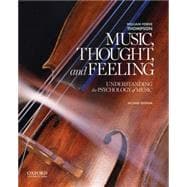Examining the intersection of music, psychology, and neuroscience, Music, Thought, and Feeling, Second Edition, surveys the rapidly growing field of music cognition and explores its most interesting questions. Assuming minimal background in music or psychology, the book begins with an overview of the major theories on how and when music became a widespread aspect of human behavior.
It also covers:
* How humans perceive music
* Links between music and emotion
* Modern neuroimaging techniques and what they tell us about music's effect on the brain
* Psychological processes involved in imagining, composing, and performing music
* Potential cognitive benefits of musical engagement
Students:
Visit the free companion website for a variety of resources








